- Home
- Mario Puzo
The Fortunate Pilgrim Page 2
The Fortunate Pilgrim Read online
Page 2
Ahh, the young wives, the young mothers, all the other young Italian women in a strange land. What cronies they were. How they ran to each other’s apartments, up and down the stairs, into the adjoining tenements. “Cara Lucia Santa, taste this special dish”—a platter of new sausage, Easter pie with wheat germ and clotted cheese and a crust glazed with eggs, or plump ravioli for a family saint’s day, with a special meat and tomato sauce. What flutters, what compliments and cups of coffee and confidences and promises to be godmother to the yet-to-be-born infant. But after the tragedy, after the initial pity and condolences, the true face of the world showed itself to Lucia Santa.
Greetings were cold, doors were shut, prospective godmothers disappeared. Who wished to be friendly with a young, full-blooded widow? Husbands were weak, there would be calls for assistance. In the tenements life was close; a young woman without a man was dangerous. She could draw off money and goods as the leech draws blood. They were not malicious, they showed only the prudence of the poor, so easy to mock when there is no understanding of the fear which is its root.
One friend stood fast, Zia Louche, an old, childless widow, who came to help, stood godmother when the fatherless Vincenzo was born and bought her godson a beautiful gold watch when he was confirmed so that Lucia Santa could hold up her head! for such a magnificent present was a mark of respect and faith. But Zia Louche was the only one, and when mourning time had passed Lucia Santa saw the world with new and wiser eyes.
Time healed the wounds and now they were all friends again. Perhaps—who knows?—the young widow had been too harsh in her judgment, for these same neighbors, true, in their own self-interest, helped her find a second husband who would feed and clothe her children. There was a marriage in church. These same neighbors gave her a glorious wedding-night feast. But Lucia Santa never let the world deceive her again.
AND SO ON this heavy summer night, with her first batch of children grown and safe, her second batch of children no longer infants except for Lena, and with some money in the post office; now, after twenty years of struggle and a fair share of suffering, Lucia Santa Angeluzzi-Corbo stood on that little knoll of prosperity that the poor reach, reach with such effort that they believe the struggle is won and that with ordinary care their lives are safe. She had already lived a lifetime; the story was over.
ENOUGH. HERE CAME Zia Louche, completing the circle. Lucia Santa paid attention, prepared to enter the torrent of gossip. But she saw her daughter Octavia coming from the corner of 30th Street, past the Panettiere and his red glass box of pizza and pale tin cans of lemon ice. Then Lucia Santa lost sight of her daughter; for one blinding moment her eyes were filled by the Panettiere’s wooden tub, brimming with red coppers and gleaming silver fishes of dimes and nickels. She felt a quick, hot surge of passionate anger that she could never possess such treasure and that the ugly baker should find fortune so kind. Then she saw the Panettiere’s wife—old, mustached, no longer able to bear children—guarding that wooden tub of copper and silver, her wrinkled shell-lidded dragon eyes flashing fire in the summer light.
Lucia Santa felt Octavia sitting beside her on the backless chair; their hips and thighs touched. This always irritated the mother, but her daughter would be offended if she moved, so she accepted it. Seeing her daughter so oddly handsome, dressed in the American style, she gave the old crony Zia Louche a smile that showed both her pride and a hint of derisive irony. Octavia, dutifully silent and attentive, saw that smile and understood it, yet she was bewildered once again by her mother’s nature.
As if her mother could understand that Octavia wanted to be everything these women were not! With the foolish and transparent cleverness of the young, she wore a powder-blue suit that hid her bust and squared the roundness of her hips. She wore white gloves, as her high school teacher had done. Her eyebrows were heavy and black, honestly unplucked. Hopelessly she compressed the full red lips to an imaginary sternness, her eyes quietly grave—and all to hide the drowning sensuality that had been the undoing of the women around her. For Octavia reasoned that satisfying the terrible dark need stilled all other needs and she felt a frightened pity for these women enchanted into dreamless slavery by children and the unknown pleasures of a marriage bed.
This would not be her fate. She sat with bowed head, listening, Judas-like; pretending to be one of the faithful, she planned treason and escape.
Now with only women around her, Octavia took off her jacket; the white blouse with its tiny red-ribboned tie was more seductive than she could ever know. No disguise could hide the full roundness of her bust. The sensual face, crown of blue-black curls and ringlets, great liquid eyes, all mocked the staidness of her dress. With malice she could not have made herself more provocative than she did in her innocence.
Lucia Santa took the jacket and folded it over her arm, an act of love that was maternal, that meant possession and dominance. But above all an act of reconciliation, for earlier that evening mother and daughter had quarreled.
Octavia wanted to go to night school, study to become a teacher. Lucia Santa refused permission. No; she would become ill working and going to school. “Why? Why?” the mother asked. “You, such a beautiful dressmaker, you earn good money.” The mother objected out of superstition. This course was known. Life was unlucky, you followed a new path at your peril. You put yourself at the mercy of fate. Her daughter was too young to understand.
Unexpectedly, shamefacedly, Octavia had said, “I want to be happy,” and the older woman became a raging fury, contemptuous—the mother, who had always defended her daughter’s toity ways, her reading of books, her tailored suits that were as affected as a lorgnette. The mother had mimicked Octavia in the perfect English of a shallow girl, “You want to be happy.#8221; And then in Italian, with deadly seriousness, “Thank God you are alive.”
IN THE COOL evening air Octavia accepted her mother’s act of peace, sat gracefully, hands folded in her lap. Remembering the quarrel, she mused on the mystery of her mother’s speaking perfect English when mimicking her children. Out of the corner of her eye Octavia saw Guido, the dark son of the Panettiere, wavering through the warm summer night toward the light of her white blouse. In his dark, strong hand he bore a tall paper cup of fruit ice, lemon and orange, which he gave her, almost bowing, whispering hurriedly something that sounded like “Don’t spoil your shirt,” and then hurrying back to the stand to help his father. Octavia smiled, took a few mouthfuls out of politeness, and passed the cup to her mother, who had a passion for ices and sucked on the cup, greedy as a child. The buzz of the old women’s voices went on.
Her stepfather turned the corner of 31st Street and entered the Avenue, wheeling the baby carriage before him. Octavia watched him go from 31st Street to 30th and back again. And as her mother’s irony bewildered her, this tenderness of the stepfather confused her emotions. For she hated him as someone cruel, villainous, evil. She had seen him give blows to her mother, act the tyrant to his stepchildren. In the faded memories of Octavia’s childhood his courting of her mother followed too swiftly the day of her real father’s death.
She wanted to look at the sleeping baby, the little sister she loved passionately, though she was her stepfather’s child. But she could not bear speaking to the man, looking into his cold blue eyes and harsh angular face. She knew her stepfather hated her as she hated him and that each feared the other. He had never dared strike her as he sometimes struck Vinnie. And she would not have minded his blows to his stepson if he had been paternal in other ways. But he brought presents for Gino and Sal and Aileen and never for Vincent, though Vincent was a child still. She hated him because he never took Vincent for walks or haircuts with his natural children. She feared him because he was strange—the evil mysterious stranger of story books, the blue-eyed Italian with the Mephistophelean face; and yet she knew that really he was an illiterate peasant, a poor, contemptible immigrant who gave himself airs. One day she had seen him on the subway pretending to read a newspaper. She had rus
hed to tell her mother, laughing, contemptuous. Her mother had only given her a curious smile and said nothing.
BUT NOW ONE of the black-clad women was telling a story about a villainous young Italian girl (born in America, naturally). Octavia attended. “Yes, yes,” the woman said. “They were married for a month, they had finished with their honeymoon. Oh, she loved him. She sat on his lap in his mother’s home. When they visited she played with his hand. Like this—” two gnarled hands with warty fingers linked themselves lovingly, obscenely, in the storyteller’s lap— “and then they went to dance, in the church. The foolishness of those young priests who do not even speak Italian! Her husband won a prize for entering the door. He took the prize and dropped to the earth, dead. His poor heart, he was always sickly. His mother had always warned him, cared for him. But now. The young bride, dancing with another man, is told. Does she rush to the side of her beloved? She shrieks. She cried, ‘No, no. I cannot.’ She fears death like a child, not a woman. The loved one lies in his own piss alone, but she no longer loved him. She cries out, ‘No, I will not look at it.’ ”
Slyly Zia Louche, her tongue rolling up both meanings, said, “Ah! You may be sure she looked at It when It was alive.” A great burst of coarse laughter from all the women filled the Avenue, drawing jealous looks from other circles of women. Octavia was disgusted, angry that even her mother was smiling with delight.
To more serious things. Lucia Santa and Zia Louche stood fast against the rest of the circle on a point of ancient history, the exact details of a scandal twenty years ago across the sea in Italy. It amused Octavia to see her mother defer to Zia Louche and the old crone valiantly do battle for her mother, each of them treating the other like a duchess. Her mother turning to Zia Louche and asking respectfully, “E vero, Comare?” And Zia Louche always answering imperiously, “Sì, Signora,” showing no callow familiarity before the others. Octavia knew the relationship behind this, her mother’s gratitude for that valuable alliance in the hour of her most terrible misfortune.
But the quarrel was too finely drawn and Octavia became bored. She got up to look at her baby half sister, staring down at the carriage, not greeting her stepfather. She gazed down at the baby girl with an overwhelming tenderness, an emotion she did not even feel for Vincent. Then she walked toward the corner of 31st Street to look for Gino, saw him playing, saw little Sal sitting on the curb. She took Sal back to his mother. Vinnie was missing. Looking up, she saw him far above her, sitting on the window sill of the apartment, dark, motionless, guarding them all.
Frank Corbo, somber, watched his big stepdaughter lean over his baby. Strange with blue eyes, object of amusement (what Italian male wheeled his baby in the summer night?), illiterate, his mind mute, he saw the beauty of the stone city in darkness, felt the hatred of his stepdaughter without returning hatred. The harsh thin face concealed a wordless and consuming anguish. His life was a dream of beauty felt and not understood, of love twisted into cruelty. Countless treasures went by like shadows, the world was locked away. In search of deliverance, he would leave the city tonight and desert his family. In the early morning hours, while it was still dark, he would meet a farm truck and disappear without a word, without quarreling or giving blows. He would work in the brown and green fields of summer, gain peace from love, restore his strength.
He suffered. He suffered as a deaf-mute suffers who would sing seeing beauty, who cannot cry out in pain. He felt love and could not give caresses. There were too many people sleeping in the rooms around him, too many beings walked the streets around him. He dreamed terrible dreams. Tapestried on black, his wife and children circled him round, and from their foreheads each drew a dagger. He had cried out.
It was late, late; the children should be in bed, but it was still too hot. Frank Corbo watched his son Gino run crazily in some sort of tagging game incomprehensible to the father, as was the child’s American speech, as were the books and newspapers, the colors of the night sky, the beauty of the summer night and all the joys of the world he felt cut off from, all colored with pain. The world was a great mystery. Vast dangers that others could guard their children against would bring him and his loved ones into the dust. They would teach his children to hate him.
But still, the father, never knowing he would be saved, wheeled the carriage back and forth. Not knowing that deep down in his blood, in the tiny mysterious cells of his brain, a new world was forming. Slowly, day by day, pain by pain, beauty by lost beauty, the walls of the world he feared so much were crumbling in the timelessness of his mind, and in a year a new fantastic world would spring up, himself the god and king, his enemies startled and afraid, his loved ones forever lost and yet that loss of love not felt or mourned. A world of such chaotic pain that he would be drowned in ecstasy, mystery and fear banished. He would be free.
But it was like magic, and no hint or warning could come beforehand. Now, this night, he put his trust in one summer of tilling the earth, as he had done so long ago, a boy in Italy.
THE WORLD HAS a special light for children, and sounds are magical. Gino Corbo moved through the clang of engines, circles of mellow lamp-post lights, heard young girls laughing, and played his game so intently that his head ached. He ran back and forth across 31st Street, trying to capture other children or surround them. But someone always backed against a wall, hand outstretched. Once Gino was trapped, but a taxi cut his opponents off and he ran back to his own sidewalk. He saw his father watching and ran to him shouting, “Gimme a penny for lemon ice.” Snatching the coin, he ran along Tenth Avenue and planned a beautiful trick. He tried to run past his mother and her friends. Zia Louche grabbed his arm and pulled him off his feet, her bony fingers a trap of steel.
His dazed, impatient eyes saw a circle of old women’s faces, some hairy and mustached. Frantic to be away, afraid the game would end, Gino tried to run. Zia Louche held him like a fly, saying, “Rest—sit with your mother and rest. You’ll be sick tomorrow. Feel how your heart is beating.” And she put her withered claw upon his chest. He pulled violently. The old crone held him and said with ferocious love, “Eh, come è faccia brutta.#8221; He understood she was calling him ugly, and that made him still. He stared at the circle of women. They were laughing but Gino did not know they laughed with delight at his fierce desire, his blazing eyes.
He spat at Zia Louche, the fake spit of Italian women that shows contempt in a quarrel. It got him free, and he was so quick that his mother hit his face only a glancing blow as he sped away. Around the corner, along 30th Street to Ninth Ave-nue, up the Avenue to 31st Street, and then through 31st Street to Tenth Avenue he would go; having traveled the four sides of the city block, he would swoop into the game out of the darkness and with one masterly stroke shatter the enemy.
But as he ran full speed toward Ninth Avenue, a line of alien boys formed a wall against him. Gino pumped his legs higher and faster and burst through, shattered them. Clutching hands tore his shirt, the wind rushed against his face. On Ninth Avenue the boys came after him, but when he turned into the darkness at the top of 31st Street they did not dare to follow. Gino stopped running and walked softly along the stoops. He was on the final side of the square and below him, at the foot of the street, near Tenth Avenue, painted into the dim yellow cones of light cast by lamp posts, his friends scurried to and fro like little black rats, still playing. He was in time.
He rested in darkness and then went very softly, slowly, down the street. In a basement room he saw a little girl leaning against a wall half white, half electric blue. She rested her head against her arm upon the wall, hiding her eyes from the cold, artificial light of the room, empty, deserted behind her. Gino knew she was playing hide and seek, not crying, and that if he waited, the deserted room would come magically alive with shrieking girls. But he did not stop, not knowing he would always remember the girl alone, hiding her eyes against a blue and white wall; desolate, never changing, as if by not stopping he left her there forever, enchanted. He went on.
A dim patch of light made him pause. He shivered. Sitting at the window, leaning out of her street-level flat, an old Irish crone rested her head on a furry pillow and watched him move past her down the empty silent street. In that weak yellow light her head was bony with age, her thin, whiskered mouth bloody with the light of a holy red candle. Behind that feral face, faintly visible in the shadows of her room, a vase, a lamp, and a graven image gleamed like old bones. Gino stared at her. The teeth bared in greeting. Gino ran.
Now he could hear the shouts of his friends; he was near the circles of light on Tenth Avenue. He crouched on the steps of a cellar, hidden, powerful, ready to strike. He never thought to be afraid of the dark basement below or of the night. He forgot his mother’s anger. He existed only for this moment and the moment he would enter the pool of light and shatter it.
High over Tenth Avenue, Gino Corbo’s half brother, Vincenzo Angeluzzi, thirteen years old, brooded to the softened, whispery sound of the summer night that floated up to him. He brooded on his window sill, the long line of rooms behind him dark and empty, the door from the hall to the kitchen securely locked. He was self-exiled.
The dream of summer, freedom, and play had been taken from him. His mother had informed him that in the morning he would start working for the Panettiere, and work until school started in the fall. He would carry heavy baskets of bread in the hot sun while other boys swam in the river, played stickball and “Johnny Ride the Pony,” and hitched onto the backs of trolley cars to see the city. There would be no sitting in the shade eating lemon ice or reading by the wall of Runkel’s factory or playing “Bankers and Brokers” and “Seven-and-a-half” for pennies.

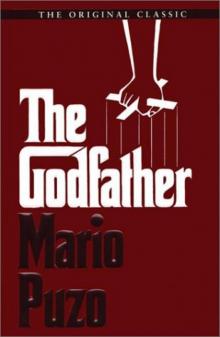 The Godfather
The Godfather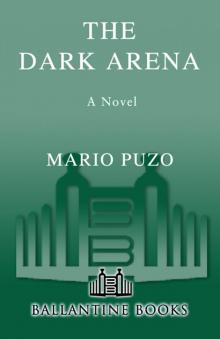 The Dark Arena
The Dark Arena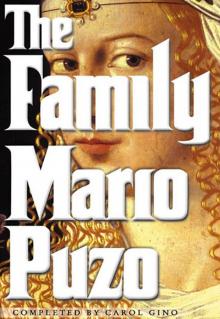 The Family
The Family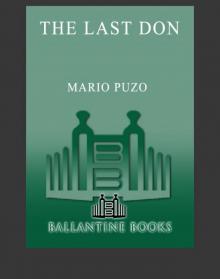 Last Don
Last Don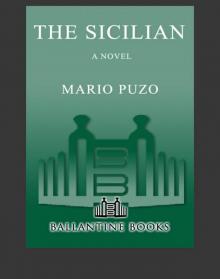 The Sicilian
The Sicilian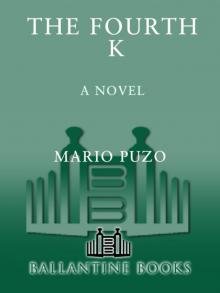 The Fourth K
The Fourth K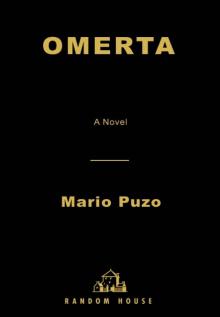 Omerta
Omerta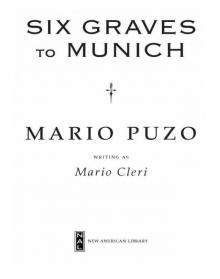 Six Graves to Munich
Six Graves to Munich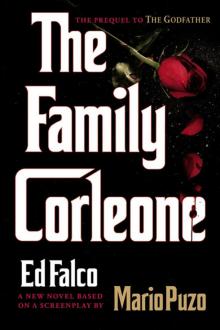 The Family Corleone
The Family Corleone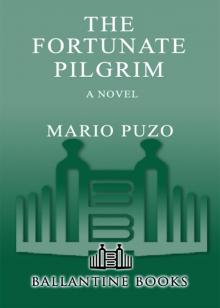 The Fortunate Pilgrim
The Fortunate Pilgrim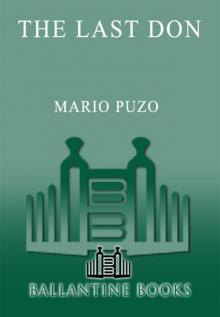 The Last Don
The Last Don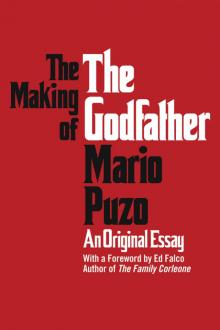 The Making of the Godfather
The Making of the Godfather Fools die
Fools die The Sicilian (v2.0)
The Sicilian (v2.0)